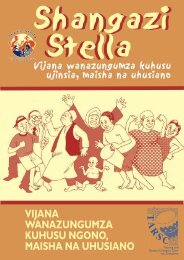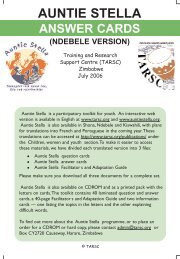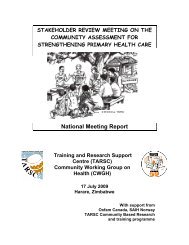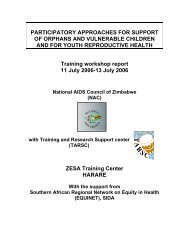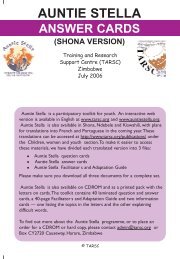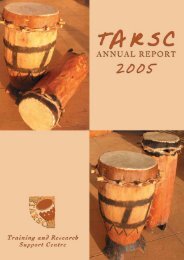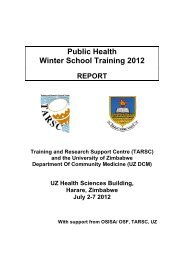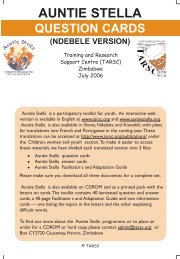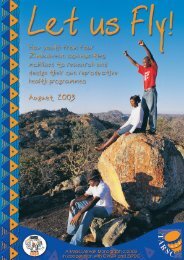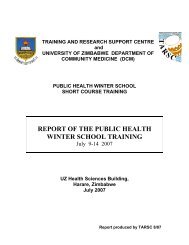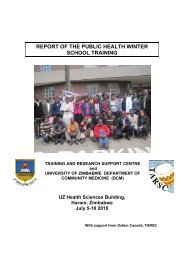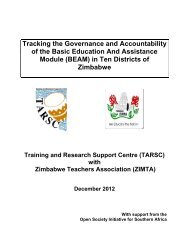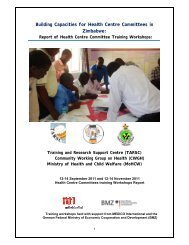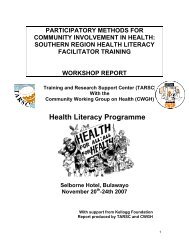HLregional meeting09.pdf - Training and Research Support Centre
HLregional meeting09.pdf - Training and Research Support Centre
HLregional meeting09.pdf - Training and Research Support Centre
Create successful ePaper yourself
Turn your PDF publications into a flip-book with our unique Google optimized e-Paper software.
what success would look like after how long) <strong>and</strong> consequently agree on the means of verification<br />
<strong>and</strong> collection methods for that information. To support such, the evaluation reflected on the<br />
importance of strengthening Health Literacy facilitator skills in basic monitoring <strong>and</strong> evaluation<br />
techniques, documentation <strong>and</strong> reporting so as to improve internal monitoring of the programme.<br />
Ms Machingura added that the evaluation, thus far, has recommended strengthening the already<br />
existing regional exchange programme to facilitate learning. To support this there is need to heighten<br />
the Health Literacy documentary film project while also investing in community films, photography,<br />
music, blogs <strong>and</strong> moderated web-based discussion forums for HL social empowerment movement.<br />
Such platforms would also facilitate the harmonisation of implementation of the programme as well<br />
as foster other health programming collaborations beyond just Health Literacy. Accordingly, this<br />
creates a ‘connect’ between the operational social movement level <strong>and</strong> the policy level networks.<br />
The evaluation further recommended the establishment of a regional technical group drawn from the<br />
respective country programmes, whose role would be to provide technical guidance to new Health<br />
Literacy country programmes. This technical group would have members with different comparative<br />
advantages, so that a wholesome pool is available as <strong>and</strong> when required<br />
In plenary Mr Tafadzwa Chigariro, the Health Education officer at the CWGH in Zimbabwe confirmed<br />
that the Health Literacy programme in Zimbabwe was effective in terms of building the capacity of<br />
individuals <strong>and</strong> organisations. It stirred communities into taking various actions related to their own<br />
health. He noted that Health Literacy facilitators at district level consistently confirmed that the Health<br />
Literacy manual was comprehensive <strong>and</strong> provided a lot of health knowledge important for community<br />
public health<br />
“The most interesting element of the manual is that it is a living manual, you can add new<br />
information, with support from TARSC we developed a Cholera pamphlet to support already existing<br />
information in manual during the Cholera epidemic in Zimbabwe <strong>and</strong> we are currently in the process<br />
of developing a pamphlet that provides information on HINI”<br />
He added that communities need to continuously receive refresher training courses so that they are<br />
kept abreast on health issues in the region, this is so because ccommunities have capacity to<br />
underst<strong>and</strong> their own Health Problems <strong>and</strong> act on them, they only need empowerment <strong>and</strong><br />
enablement through imparting them with skills to make the best use of the available resources. He<br />
added that implementation in Zimbabwe has been successful due to the existing community<br />
structures. These structures are structures that are already recognised by government. The inclusion<br />
of civil society in supporting their existence increases accountability <strong>and</strong> their efficiency. Despite the<br />
unstable socio-economic <strong>and</strong> political environment over the past three years that has caused<br />
migration of some of the trained Health Literacy facilitators in some urban areas Health Literacy has<br />
been implemented successfully. He argued that it was important for TARSC <strong>and</strong> CWGH to lobby the<br />
government towards taking up of the programme as part of the national health promotion strategy.<br />
Mr Saiti Chikwapulo from MHEN also added that The Health Literacy programme had enhanced<br />
technical competency among MHEN secretariat members with regards to more in-depth<br />
underst<strong>and</strong>ing of participatory health promotion <strong>and</strong> social empowerment issues. Further the<br />
programme was benefitting the MHEN partner organisations from which the facilitators came from, in<br />
the application of PRA approaches to other development interventions beyond just health.<br />
Subsequently the Health Literacy programme led to a significant improvement in health service<br />
delivery <strong>and</strong> more responsive implementation of health policies by relevant authorities.<br />
Mr. Chikwapulo added that while the evaluation could have regarded the differing approaches in<br />
implementation in the districts as a weakness, MHEN felt that it was a strength in that Health<br />
Literacy facilitators showed competency in their flexibility skills to implement health literacy in the<br />
best way they saw fit depending considering the context in which the Health Literacy programme<br />
was being implemented. Behaviour <strong>and</strong> cultural contexts have to be taken into consideration when<br />
implementing health literacy in any locale. Like in Zimbabwe, the experience in Malawi also<br />
confirmed that the involvement of local authorities was fundamentally significant in the realisation of<br />
Health Literacy implementation community participation. He noted that periodic field visits to<br />
communities where the programme was being implemented was key in mentoring <strong>and</strong> supporting<br />
local health Literacy issues.<br />
Mr Ronald Ketshabe representing the BFTU observed that the Health Literacy programme was<br />
significantly complimenting government’s efforts in revitalising primary Health care in Botswana. He<br />
added that the Health Literacy programme offered an opportunity to define community structures that<br />
enhance community engagement at participation at that level <strong>and</strong> beyond.<br />
21



